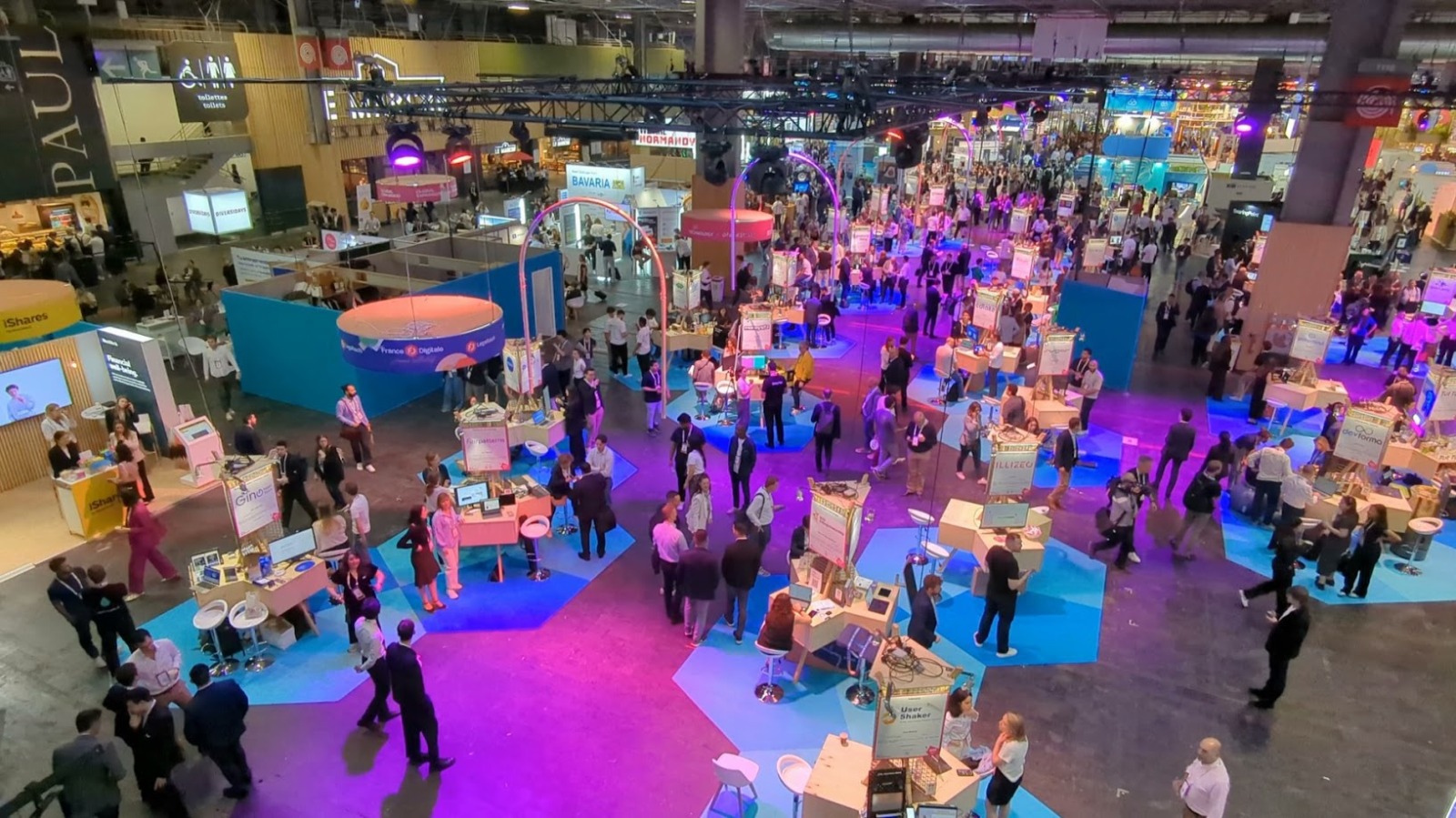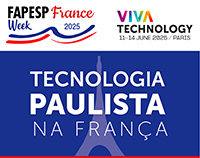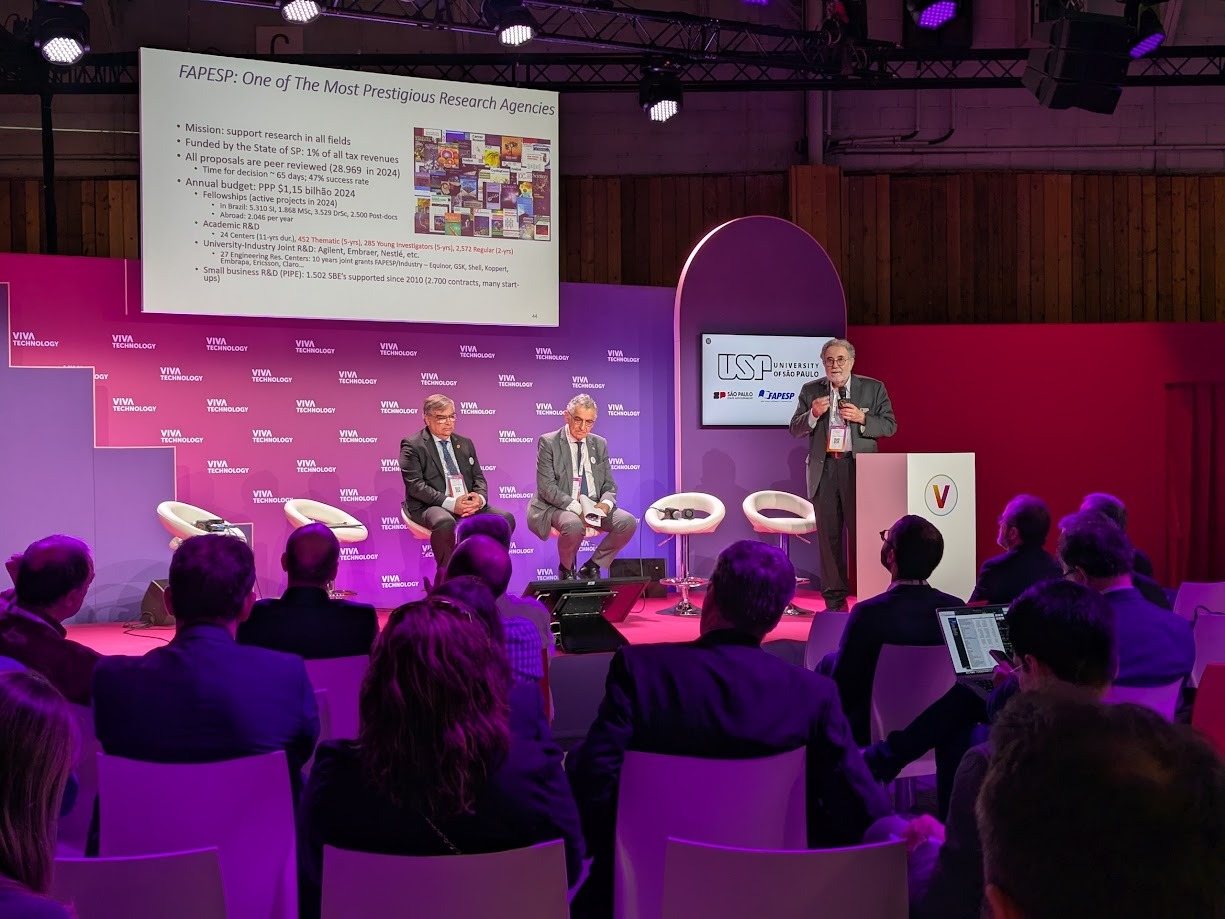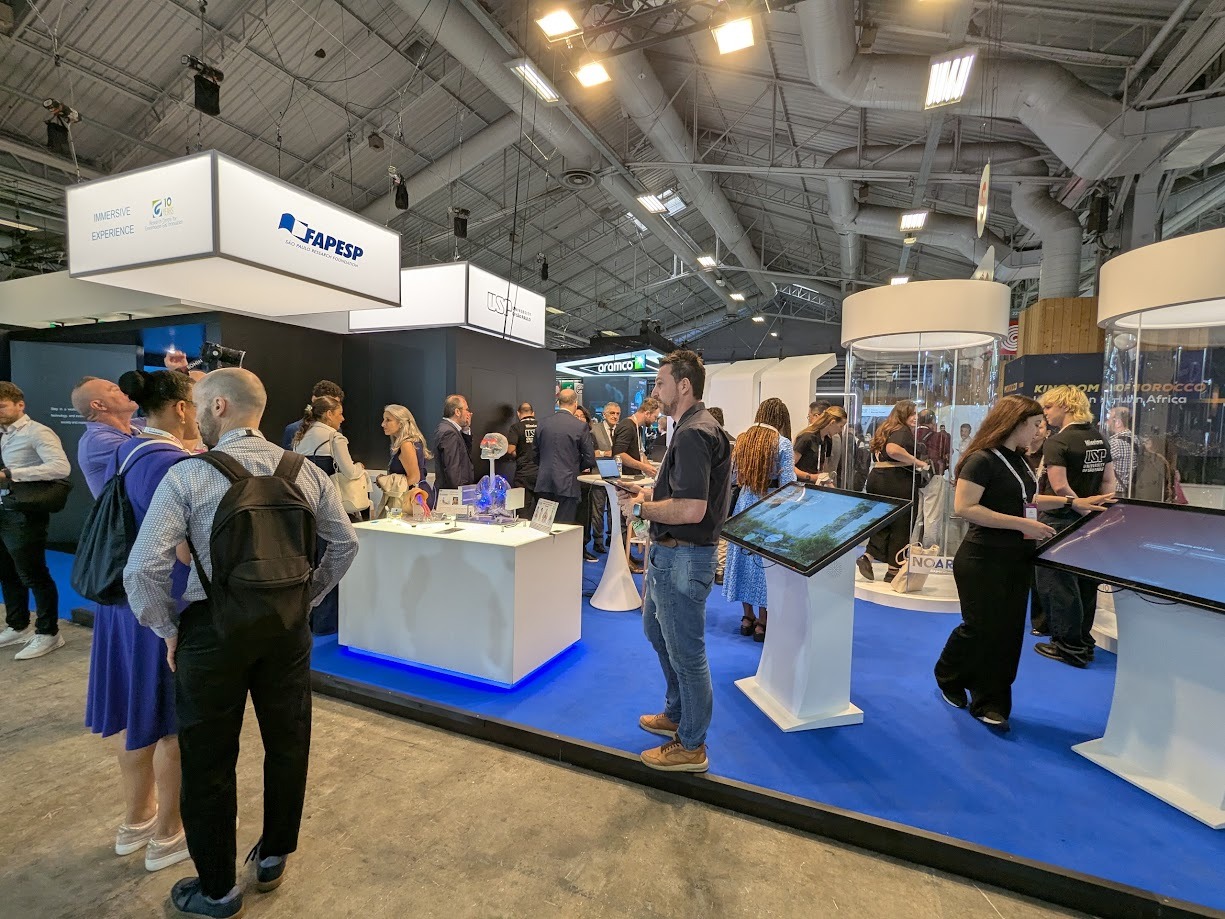


Until Saturday, more than 13,000 startups from dozens of countries will showcase their products and solutions to an estimated 170,000 visitors at the 9th edition of VivaTech (photo: Heitor Shimizu/Agência FAPESP)
Published on 06/12/2025

By Heitor Shimizu, from Paris | Agência FAPESP – The 9th edition of Viva Technology (VivaTech), Europe’s largest startup and technology event, began on June 11th. The event brought together entrepreneurs, scientists, business leaders, and investors in Paris to explore the frontiers of innovation in a wide range of areas.
Until Saturday, more than 13,000 startups from dozens of countries will showcase their products and solutions to an estimated 170,000 visitors at Paris Expo Porte de Versailles. Nineteen of the startups are supported by the University of São Paulo (USP) and FAPESP, which demonstrates the strength of Brazil’s deep tech ecosystem. These companies operate in sectors that are fundamental to Brazil, including agriculture, health, energy, and materials (read more at: agencia.fapesp.br/54959).
“International visibility is very important for research conducted in the state of São Paulo. We’ve produced a lot of high-quality science that unfortunately doesn’t receive the attention and recognition it deserves. Today, science is globalized, and internationalization allows our researchers to have new and different references, which is important for improving the quality of our activities. This process makes our researchers, students, and inventors more competitive and less afraid to compete internationally,” said Vahan Agopyan, Secretary of Science, Technology, and Innovation of São Paulo, to Agência FAPESP.
Carlos Américo Pacheco, CEO of FAPESP, highlighted the importance of FAPESP and USP’s support in enabling São Paulo researchers and startups to participate in VivaTech. This participation allows them to expand their strategic connections, increase the international visibility of their innovations, and attract investors.
During the opening day of the event, Pacheco gave a presentation on the importance of research conducted in the state of São Paulo. “If São Paulo were a country, it’d be the one with the highest scientific output among all Latin American countries. In addition, we have more than 10,000 innovation companies in the state,” he said.
Pacheco also spoke to the audience about some of the instruments that FAPESP uses to stimulate scientific cooperation by attracting scientists from around the world to São Paulo.
“We recently announced two new initiatives – the International Call for Young Researchers and the International Thematic Grant – to enable scientists, whether they’re starting their careers or are already established and in either case leaders in their fields of knowledge, to carry out research projects in São Paulo,” he said.
Agopyan praised the initiatives and highlighted the role of FAPESP in supporting research and innovation. “The state of São Paulo is the region in the Southern Hemisphere that has stood out the most in international rankings for innovation and startup development. One of the main reasons for this is that São Paulo has several important instruments to stimulate research, such as the programs of FAPESP, an autonomous support foundation with the capacity to provide long-term financing, allowing for the development of more in-depth research,” he said.
“Another highlight of São Paulo is the fact that we have world-class universities – not only the three state universities but also federal universities and private institutions that excel in their respective fields. With a high-quality university environment and funding, we’re able to train highly competent human resources – so competent that they’re increasingly sought after internationally. So we have all the necessary ingredients: an excellent workforce, excellent research, and guaranteed funding,” the state secretary added.

Carlos Gilberto Carlotti Junior, Dean of USP, Vahan Agopyan, Secretary of Science, Technology, and Innovation of São Paulo, and Carlos Américo Pacheco, CEO of FAPESP (photo: Heitor Shimizu/Agência FAPESP)
A university that innovates
Carlos Gilberto Carlotti Junior, Dean of USP, emphasized the importance of having its own stand at VivaTech to showcase the university’s current and past innovations, as well as examples of its cutting-edge research in various fields. During the four-day event, USP scientists will welcome members of the public interested in São Paulo research.
“USP has always been innovative, but in recent years, we’ve stepped up these activities. We want to be increasingly closer to the population, whether through public policies, the production of solutions for cities, or in various other areas. For this to happen, we need to publicize our activities, our startups, and our spin-offs,” he told Agência FAPESP. ”Participating in VivaTech aims to showcase our innovations, establish contacts and partnerships, and connect with major financiers.”
Centers of excellence
FAPESP and USP brought startup representatives to VivaTech with innovations in various fields, as well as scientists who run centers of research excellence in areas such as energy, climate, agriculture, photonics, and artificial intelligence.
“The field of artificial intelligence, which has changed a lot in the last 15 years, is a technology that’s now understood as critical and crucial by all countries. And it’s a field in which São Paulo and Brazil have a great opportunity, as they have institutions that collect and produce quality data, as well as strong academic and entrepreneurial structures. We can benefit greatly, make great strides in this area – and, with that, gain more visibility,” evaluated Fabio Cozman, director of the Center for Artificial Intelligence (C4AI), one of the leading artificial intelligence research centers in Latin America. The center is located at USP and receives support from IBM and FAPESP.
“USP has been producing significant work in artificial intelligence for decades, with several prominent groups, and the C4AI seeks to contribute to the development of the field, as well as connect different groups and find synergies. Participating in VivaTech is an opportunity to showcase our innovations to both the general public and entrepreneurs, as well as to reflect on the best opportunities, learn from others, and identify the best paths forward,” Cozman told Agência FAPESP.
“We chose to present a new development involving the use of photonic technologies for treating antibiotic-resistant infections at VivaTech. The focus is on pneumonia, which is the deadliest infection due to the problem of bacterial resistance,” said Vanderlei Bagnato, coordinator of the Center for Research in Optics and Photonics (CePOF) and the National Institute of Science and Technology for Basic Optics Applied to Life Sciences.
“Participating in VivaTech is a unique opportunity, as it brings Brazilian researchers and innovators to an international event of this magnitude. At CePOF, we have research collaborations with several European countries, such as Germany, Italy, and France itself, and being able to show that the results of our work go beyond the country’s borders is very important. But more than just sporadic collaborations, which are important as a starting point, we need to be one of the main players in large international projects and consortia,” emphasized Bagnato.

Nine FAPESP-supported companies are present at VivaTech (photo: Heitor Shimizu/Agência FAPESP)
The Foundation’s participation in VivaTech is part of the FAPESP Week France program. For more information, visit: fapesp.br/week/2025/france.
Source: https://agencia.fapesp.br/55035